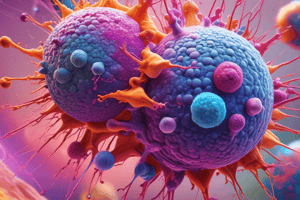Podcast
Questions and Answers
What is metabolism primarily concerned with?
What is metabolism primarily concerned with?
- Reproduction of cells
- Cellular communication
- Growth of organisms
- Energy conversions and chemical processes (correct)
What are the two main processes of metabolism?
What are the two main processes of metabolism?
- Fermentation and glycolysis
- Oxidation and reduction
- Photosynthesis and respiration
- Anabolism and catabolism (correct)
Which process converts light energy into chemical potential energy?
Which process converts light energy into chemical potential energy?
- Photosynthesis (correct)
- Fermentation
- Glycolysis
- Cellular respiration
According to the first law of thermodynamics, what happens to energy in a system?
According to the first law of thermodynamics, what happens to energy in a system?
What is the definition of energy in a biological context?
What is the definition of energy in a biological context?
In a biochemical reaction, what does ΔH represent?
In a biochemical reaction, what does ΔH represent?
What type of reaction is characterized by the release of energy?
What type of reaction is characterized by the release of energy?
What does the second law of thermodynamics state about entropy?
What does the second law of thermodynamics state about entropy?
What is Gibbs Free Energy (ΔG) used to predict?
What is Gibbs Free Energy (ΔG) used to predict?
If ΔG is negative, what does this indicate about the reaction?
If ΔG is negative, what does this indicate about the reaction?
What does it mean if ΔG is positive?
What does it mean if ΔG is positive?
What occurs when ΔG equals zero?
What occurs when ΔG equals zero?
Which of the following statements is true regarding ΔG?
Which of the following statements is true regarding ΔG?
What is the relationship between heat lost (Q) and work done (W) in a system?
What is the relationship between heat lost (Q) and work done (W) in a system?
What is the primary source of energy for most biological processes?
What is the primary source of energy for most biological processes?
In biological systems, how does pressure and volume change during a reaction?
In biological systems, how does pressure and volume change during a reaction?
Which of the following describes an endergonic reaction?
Which of the following describes an endergonic reaction?
Anabolic processes involve:
Anabolic processes involve:
What is the primary purpose of catabolic processes?
What is the primary purpose of catabolic processes?
What does the term "dynamic equilibrium" imply in a biochemical context?
What does the term "dynamic equilibrium" imply in a biochemical context?
Why might a reaction with a negative ΔG still not occur rapidly?
Why might a reaction with a negative ΔG still not occur rapidly?
Which of the following factors can influence the rate of metabolic reactions?
Which of the following factors can influence the rate of metabolic reactions?
What do metabolic pathways often involve?
What do metabolic pathways often involve?
How is energy stored in biological systems?
How is energy stored in biological systems?
What is the effect of increasing entropy in a system?
What is the effect of increasing entropy in a system?
Which of the following best describes a system at equilibrium?
Which of the following best describes a system at equilibrium?
In a biochemical reaction, what does the term "exergonic" imply about the free energy change?
In a biochemical reaction, what does the term "exergonic" imply about the free energy change?
Which statement is true regarding enzymes in metabolic reactions?
Which statement is true regarding enzymes in metabolic reactions?
What role does ATP play in metabolism?
What role does ATP play in metabolism?
What is the primary consequence of a reaction being endothermic?
What is the primary consequence of a reaction being endothermic?
Flashcards
Capital of France (example flashcard)
Capital of France (example flashcard)
Paris



